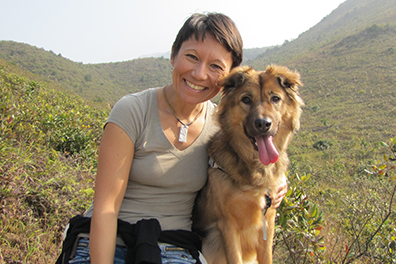Monica Bando’s Three Minute Thesis
Hidden Harm of Bear Bile Farms
10,000 to 20,000 endangered Moon bears, also known as Asiatic black bears (Ursus thibetanus), are currently farmed for their bile on bear bile farms. Bear bile has a longstanding history in traditional medicines, however numerous synthetic and plant alternatives exist. Farming bears for their bile is a serious animal welfare and bear conservation issue. Bears on farms are often permanently confined to cages and undergo surgeries to secure access to the gallbladder to allow farmers to harvest bile repeatedly from living bears. As a veterinarian, working for Animals Asia, I helped rescue bears from bile farms and can attest to the severe disease and trauma experienced by bile-farmed bears. Bears on bile farms develop numerous health problems, including malnutrition, chronic infections, liver cancer, and death. We have recently identified a rare heart disease in which the aorta, the largest blood vessel leaving the heart, becomes enlarged (aortic aneurysm) and ruptures, causing sudden death. Aortic dilation or aneurysms have never been reported in any bears anywhere in the world, yet we are seeing growing numbers of bile-farmed bears develop this disease. The purpose of my PhD is to identify the link between bile-farming and development of aortic enlargement. We hypothesize the bile extraction sites cause chronic infections creating high blood pressure leading to enlargement and bursting of the aorta. We have compiled heart and health information from bile-farmed bears and non-farmed bears, including wild and zoo bears. We are analyzing blood and urine samples, heart ultrasounds, and tissues from deceased bears. The purpose of my research is to demonstrate the harm caused by farming bears for bile. My hope is to provide the science based evidence urgently needed to impact bile farming policies to end this unnecessary practice.
Monica Bando obtained her Master’s degree in marine biology from the University of Alaska Fairbanks where she studied Steller sea lions in anticipation of a career in wildlife medicine. She then attended veterinary school at Massey University in New Zealand. After graduating in 2007, Monica worked as an associate veterinarian at a small animal private practice in Northern California. In 2010, she joined the international animal welfare charity Animals Asia and became the senior veterinarian at the China Bear Rescue Center where she helped rescue and rehabilitate bears from bile farms. In addition to providing extensive veterinary care to over 150 rescued bears, Monica assisted with Animals Asia’s additional animal welfare outreach projects. These included providing support to shelters overburdened with dogs and cats rescued from meat markets, veterinary skills training to veterinary students and veterinarians, and training workshops in collaboration with the China Association of Zoological Gardens to improve standards of care for captive wildlife. Monica volunteered as a field veterinarian for the Scandinavian Brown Bear Research Project in Sweden. She has also examined free-ranging and captive Asiatic black bears in Japan. Monica was offered a PhD position at Washington State University’s College of Veterinary Medicine and moved to Pullman in 2015. The focus of her research is rare cardiovascular disease affecting bile-farmed bears. Monica hopes to continue a career in animal welfare, education/outreach, and wildlife conservation.
